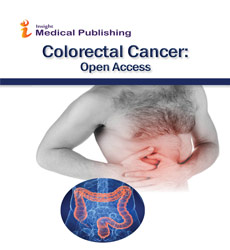Metastatic Colorectal Cancer Procedure on a Range Of Parameters and Its Cancer Growth
D Santanu*
Department of Biophysics, University of Calcutta, Kolkata, India
- *Corresponding Author:
- D Santanu
Department of Biophysics, University of Calcutta, Kolkata, India
Tel: 13133431121
E-mail: santanu@bugworksresearch.com
Received Date: December 03, 2021; Accepted Date: December 1, 2021; Published Date: December 23, 2021
Citation: Santanu D (2021) Metastatic Colorectal Cancer Procedure on a Range Of Parameters and Its Cancer Growth. Colorec Cancer Vol:7 No:6
Abstract
Cancer that originates in the colon or rectum is colorectal cancer. Stadium 0, which is extremely early cancer, to stage 4, metastatic colorectal cancer is stage 4 of this form of cancer. Colorectal metastatic cancer is a metastatic malignancy. It, therefore, spreads to local or remote locations, such as other organs or lymph nodes. Although cancer spreads to any region of the body, according to the National Cancer Institute Trusted Source, colorectal cancer is the most common disease transmitted to the liver, lung, or peritoneum. Change in bowel habits such as nausea, or thin stools, which are longer than a few days, may make a stool seem reddish blood maroon, or black blood rectal as if the colon did not empty bowel to cramp or discomfort. You may have another a clinical trial, if you have tried some colon cancer therapy and they have not worked or ceased in clinical trials, researchers are exploring novel approaches to stage IV colon cancer. These studies evaluate novel therapies for the safety and work they provide a method for sampling a new drug that is not accessible to everybody. If one of the studies might be helpful for you, your doctor can inform you
Introduction
Cancer that originates in the colon or rectum is colorectal cancer. Stadium 0, which is extremely early cancer, to stage 4, metastatic colorectal cancer is stage 4 of this form of cancer.Colorectal metastatic cancer is a metastatic malignancy. It therefore spreads to local or remote locations, such as other organs or lymph nodes. Although cancer spreads to any region of the body, according to the National Cancer Institute Trusted Source, colorectal cancer is the most common disease transmitted to liver, lung or peritoneum.
Approximately 21% Trusted sources of colorectal cancer newly diagnosed patients have remote metastatic illness when they are diagnosed. In later stages once the disease has grown or spread, colorectal cancer will produce symptoms more probable.
Colorectal cancer symptoms
Change in bowel habits such obstruction, nausea, or thin stools, which continue longer than few days, may make a stool seem reddish blood maroon, or black blood rectal, as if the colon did not empty after bowel motion. Fatigue to cramp or discomfort
Unexplained Anaemia for weight reduction
Colorectal cancer effective procedure on a range of parameters,
Including the extent and size of the tumour and location,. Your age, general health and probable cancer side effects are also taken into account. Your physician will work with you to find the best therapy for your particular circumstance.
The Study Published is seldom treatable from metastatic colorectal cancer. Treatment is typically aimed at prolonging your life and alleviating or preventing symptoms, Metastatic colorectal cancer can in rare circumstances be treated by eliminating all tumours surgically, In order to manage cancer as often as possible, metastatic colorectal cancer treatment often continues.
How does colorectal metastatic cancer grow?
Colorectal cancer generally starts as a polype, which develops slowly over the course of several years within the lining of your rectum or colon, after the cancer develops, the colon or rectum can expand further and then infect blood or lymph vessels. It is also possible. In adjacent lymphatic nodes cancer cells spread and are transferred to different bodies or tissues in your blood arteries.
The liver, lung and peritoneum are the most frequent locations for colorectal cancer to spread. However, cancer may also spread to other regions of your body including your brain and bones.
What is Advanced Or metastatic Colon Cancer Perspective?
Ask your physician 12 questions
Will colon cancer spreads to liver?
What is your liver's advanced colon cancer?
What are Complaints, treatment and test results?
What are your options for treatment?
Living on the spread of colon cancer?
What is your physician monitoring?
How to Manage Negative and Sides Effects?
You will have many questions, including what this will mean for your future whenever your surgeon told you that you do have colon cancer that has spread to other areas, it’s different for all of us. Unless the condition cannot be cured, therapies can help you live longer and less painfully, to make your quality of life as excellent as possible.
Conclusion
You may have another alternative, a clinical trial, if you have tried some colon cancer therapy and they have not worked or ceased functioning, in clinical trials, researchers are exploring novel approaches of treating stage IV colon cancer. These studies evaluate novel therapies for the safety and working conditions. Often they provide a method for patients to sample a new drug which is not accessible to everybody. If one of the studies might be helpful for you, your doctor can inform you.
Open Access Journals
- Aquaculture & Veterinary Science
- Chemistry & Chemical Sciences
- Clinical Sciences
- Engineering
- General Science
- Genetics & Molecular Biology
- Health Care & Nursing
- Immunology & Microbiology
- Materials Science
- Mathematics & Physics
- Medical Sciences
- Neurology & Psychiatry
- Oncology & Cancer Science
- Pharmaceutical Sciences
